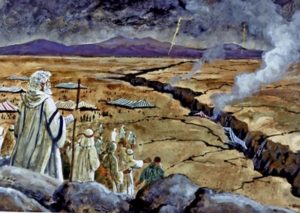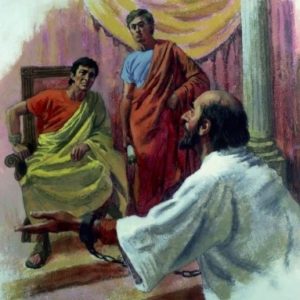TODAY’S READING FROM THE OLD TESTAMENT- 1 CHRONICLES 5:18-6:81
The Reubenites, Gadites, and the half tribe of Manasseh were successful in battle because they cried out to the Lord (1 Chron 5:20).
We are catching up with the apostasies among the descendants of Israel.
Among the heads of the families of the half tribe of Manasseh were brave warriors and famous men. Sounds good? Read on:
1 Chronicles 5:25 25 But they acted treacherously against the God of their fathers and played the harlot after the gods of the peoples of the land, whom God had destroyed before them.
The consequence of their disobedience was that they were taken into the Assyrian captivity by Tiglath-Piliser, king of Assyria, as they became one of the lost tribes of Israel.
We have the listing of the tribe of Levi. Moses is a descendant through his father, Amram, a Kohathite (1 Chronicles 6:3).
We then follow the lineage of the high priest Aaron and see among them such notables as Phineas, Zadok, and Azariah, who served as priest in the house which Solomon built in Jerusalem. The genealogy extends to the descendants that were taken into Babylonian captivity. Jozadak was the descendent of Aaron that was taken captive at Jerusalem and brought to Babylon.
The sons of Levi are listed in 1 Chronicles 6:16-30. In this list, you will recognize the names of Kohath (Numbers 4:15) and Korah (Numbers 16; Jude 1:11).
The prophet Samuel’s name shows up in 1 Chronicles 6:26. We learn the names of his sons, Joel and Abijah.
There is a wonderful list of worship leaders beginning in verse 31 and those who ministered to the Lord in song.
Aaron and his sons served the altars in the outer court, in the holy place, and the most holy place on the Day of Atonement (6:49).
From verse 54, we have their settlements listed.
Of the 48 cities allotted to the Levites, 6 were cities of refuge. They are included in the assignments. See if you can recognize them.
TODAY’S READING FROM THE NEW TESTAMENT – ACTS 26:1-32
In the context of Paul’s testimony before King Agrippa, we are told of his ‘heavenly vision.’
‘Heavenly vision’ could be misconstrued as a man-made vision with heavenly characteristics. However, the better translation might be – ‘Vision from heaven.’
The heavenly vision is not your private imagination of a preferred future. Our culture is obsessed with ‘success mantras’ such as ‘what the mind can conceive, you can achieve’.
However, when Paul speaks of his heavenly vision he is talking about his very real encounter with the Risen Jesus of Nazareth. He saw the real Jesus on the road to Damascus. He knew what he saw. He knew what he heard. He was convinced it was the person of Jesus. He was convinced that what he saw was of divine origin. The heavenly vision is the reality that the Jesus that rules at the right hand of God is the same Jesus that lived a sinless life, died a substitutionary death to atone for man’s sins, was raised from the dead, and ascended to God the Father.
What we do in life will be dependent upon what we see. And the most important thing we can possibly see is the truth as it is made known to us in Christ Jesus.
Paul knew Whom he had seen and what he had been called to do. May his commission refresh you in the knowledge of God’s calling upon your life.
Acts 26:16-18 16 ‘But get up and stand on your feet; for this purpose I have appeared to you, to appoint you a minister and a witness not only to the things which you have seen, but also to the things in which I will appear to you; 17 rescuing you from the Jewish people and from the Gentiles, to whom I am sending you, 18 to open their eyes so that they may turn from darkness to light and from the dominion of Satan to God, that they may receive forgiveness of sins and an inheritance among those who have been sanctified by faith in Me.’
Paul is always ready to give a reasonable answer for his standing as a believer in Jesus Christ.
As he speaks before Festus and his guests, King Agrippa and Bernice, he has carefully thought through his defense. He hangs his testimony on the solid nail of the resurrection of Jesus Christ and the promise of our future resurrection when we will appear before Him as our righteous judge.
We should never underestimate the powerful testimony and implications of the resurrection of Jesus Christ. It signals that the claims of Jesus Christ are to be heeded.
This approach is similar to what we read in Chapter 23 when Paul appeared before the Sanhedrin.
Acts 23:6b “I am on trial for the hope and resurrection of the dead!”
Notice how the resurrection of Christ was central in the preaching of the apostles throughout the book of Acts (Acts 2:24, 3:14-15; 4:1-5, 8-10, 32-35; 5:29-32; 10 and 13; 17:30-31).
We learn a lot about sharing the gospel in this chapter. Notice how Paul respects his audience and their intelligence (Acts 26:3).
He shares his testimony and highlights what he has in common with his audience. Paul says that he is on trial for having the hope that was shared by all those who believed that the God of the Scriptures had promised salvation.
He points to the gospel facts. The Jesus He believes in was raised from the dead. He challenges their faith. Do they believe that God is God or that He is just a greater and larger version of themselves?
Acts 26:8 8 “Why is it considered incredible among you people if God does raise the dead?
Paul points out that there is a reason behind people’s unbelief. It is not an intellectual one as much as it is a false view of God and a false view of themselves.
Paul’s testimony is so powerful. This is the third time we read of it.
Albert Henry Ross wrote under the pseudonym Frank Morrison, the book titled “Who Moved the Stone.” He had this to say about Paul’s testimony.
“How can we account for this incident having the admittedly historical consequences that it did? Why should a man of this tough breed and of this admittedly sane and virile mental caliber be uprooted in an instant from his cherished beliefs and swept like chaff before the wind into the dogmatic camp of his most hated enemies?
It is not the immediate effects of the conversion that we are concerned with, though these are noteworthy. But how did this reorientation of a man’s entire presuppositions survive the solitary communion in Arabia, the nine years’ patient waiting in Tarsus, and all the bitter persecutions and hardships of the great missions? Why was one of the greatest intellects of the ages brought over and fixed in an instant of time from one pole of dogmatic belief to another?”
There were three responses to the gospel found in this passage:
- Denial (and mocking). This was the response of Festus. “Paul, you are out of your mind! Your great learning is driving you mad” (Acts 26:24).
- Avoidance (and pride). This was the response of King Agrippa. Paul assures him that because he knows the gospel events, the historic reality of the death, burial, and resurrection of Jesus, and because he has the words of the prophets, he should know enough to believe. For “this was not done in a corner.” The evidence is plain and demands a verdict. Agrippa does not deny, but he cautiously distances himself, mindful that full surrender is the logical implication of belief in the risen Christ.
Acts 26:28 28 Agrippa replied to Paul, “In a short time you will persuade me to become a Christian.”
Perhaps he feared being mocked by his host, Festus? His pride was so great that even when he could not argue against Paul’s proclamation, he would not allow himself to be identified with these Christians and their message. He could not forego the sins of the palace to follow the true King of Kings.
- Faith in the risen Christ. This is the response of Paul. All three men were faced with the same truth, but each had a different response. Paul is a firm believer, and he calls all, whether rich or poor, male or female, Jew or Gentile to be as he is, a follower of Jesus.
Acts 26:29 29 And Paul said, “I would wish to God, that whether in a short or long time, not only you, but also all who hear me this day, might become such as I am, except for these chains.”
It is good for us to consider what our response is to the reality of the finished work of Christ that was sealed with the historic fact of resurrection. Are you a believer? Or are you living in denial, avoidance, pride or unbelief?
TODAY’S READING FROM THE BOOK OF PSALMS- PSALM 6:1-10
This Psalm, attributed to David, is a prayer request for mercy in times of trouble. In verses 1-7, he pours out his sorrows. He has foes without and fears within. He was sure he was facing death and was hoping to be able to praise God for his deliverance from his woes before he dies.
Psalm 6:5 5 For there is no mention of You in death; In Sheol who will give You thanks?
By verse 8, he has packed up his sorrows and given them to the Lord. He takes courage in the fact that the Lord hears our prayers (v.8), and He is faithful to deliver us.
Psalm 6:9 9 The LORD has heard my supplication; The LORD receives my prayer.
Psalm 6:10 10 All my enemies will be ashamed and greatly dismayed; They shall turn back; they will suddenly be ashamed.
TODAY’S READING FROM THE BOOK OF PROVERBS- PROVERBS 18:20-21
Proverbs 18:20-21 20 With the fruit of a man’s mouth his stomach will be satisfied; He will be satisfied with the product of his lips. 21 Death and life are in the power of the tongue, and those who love it will eat its fruit.
PRAY FOR THE NATIONS- We continue to pray for Indonesia.
http://www.operationworld.org/prayer-app/
PRAYER: Lord, we are grateful for the magnificent rescue of our Redeemer. Thank you that we have the historic cross to point to with its empty grave and stalwart witnesses. Give us a boldness to engage with others and proclaim why we are identified with Christ. May we, like the apostles, understand the needs of our audience, share the common ground with have with them as we relate our testimony, and may be faithfully communicate the core reality of the resurrection and what it means. We pray for open doors to share the gospel this day. In Jesus’ Name. Amen.
